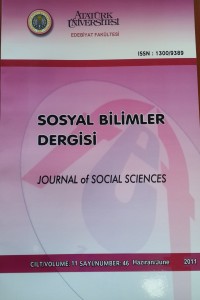Descartes ve Locke’un Epistemolojisi ve Sonuçları Üzerine / Descartes And Locke's Epistemology And On The Results
Abstract
Ö Z E T
Bu çalışmada amacımız, 17.yy’da bilgi sorununa çözüm arayan ve birbirinden farklı
iki yöntemden hareket eden Descartes ve Locke’a göre, bilginin nasıl ortaya
konduğunu ve bu kavrayışlardan doğan sonuçları araştırmaktır. Her iki filozofun
da başlangıç noktasını ‘kuşku’ oluşturmakla birlikte vardıkları sonuç farklıdır.
Descartes’in tümdengelim metodu vasıtasıyla elde ettiğini düşündüğü bilgi, özgür
bir toplumun temelini oluşturacak bilimsel bilgi olmaktan uzaktır. Bu bilgi
kavrayışının baskıcı rejimlere teorik bir temel sunduğunu söylemek yanlış olmaz.
Locke’un bireyselliğe ve özgürlüğe kapı açan deneyci yöntemi ise, insan yaşamına
dışarıdan müdahale edecek tüm kurumların gerçekliğini sorgular. Bu anlamda
insanın yaşamında mutluluğa ilişkin belirlemelerinde kendi aklı ve deneyiminin
dışında hiçbir kılavuzu gerekli görmeyen bir sistemi çağrıştırır. Sonuç olarak hem
Descartes’in hem de Locke’un asıl önemli etkisinin, onların epistemolojilerinden
doğan ahlaki ve siyasi sonuçları dolayısıyla olduğunu söyleyebiliriz.
Anahtar Kelimeler: Tümdengelim, tümevarım, bilimsel bilgi
AB S T R AC T
The aim of this study is to investigate how Descartes and Locke understood the
nature of knowledge in 17th century each from two different point of views and
the implications of their understandings. Although the starting point was “doubt”
in both philosophers, they reached two different results. The knowledge which
Descartes thought to have obtained through deductive method is far from being
scientific in its nature which is expected to form the very foundation of a liberal
society. On the contrary, it would not be unfair to claim that this sort of knowledge
could form the base for oppressing regimes. In contrast, the empirical method
proposed by Locke which is more in line with individuality and liberty questions
all external institutions intervening human life. His notion of knowledge indicates a
system that does not require anything except reason and experinece with regard to
obtaining individuals’ happiness. As a result it could be argued that impact of Locke
and Descartes lies not in their epistemelogies per se but rather in the ethical and
political implications of such epistemologies.
Keywords: Deduction, induction, scientific knowledge
Keywords
References
- LİNNEL, John, (Mar.,1956), ‘Abstract İdeas’, Philosophy and Phenomenolojical Research, Vol. 16, No.3, pp.400-405
- LOCKE, John (1998) Hoşgörü Üzerine Bir Mektup, Yayına Hazırlayan: Melih Yürüşen, 2. Baskı, Liberte Yayınları, Ankara.
- LOCKE, John, İnsan Anlığı Üzerine Bir Deneme, Çev: Vehbi Hacıkadiroğlu, Kabalcı Yay., Mart 2004, İstanbul,
- LOCKE, John (1999) Tabiat Kanunu Üzerine Denemeler, Çev: İsmail Çetin, Birinci Basım, Paradigma Yayınları, İstanbul.
- LOCKE, John (2005) Two Treatises of Government, Edited an İntroduction and Notes by: Peter Laslett, seventeenth printing, Cambridge University Press, New York.
- LOEMKER, Leroy E., (1973) ‘Leibniz And Limits of Empiricism’, The Philosophy of Leibniz and the Modern World, Edited by: Ivor Leclerc, Vanderbilt University Press, Nashville.
- MUSGRAVE, Alan (1997) Sağduyu, Bilim ve Kuşkuculuk (Bilgi Kuramına Tarihsel Bir Giriş), Çev: Pelin Uzay, Birinci Baskı, Göçebe Yayınları, İstanbul. NUTKU, Uluğ (1977) Descartes’in İmmanent Apriorisi (Subjektif Kausalite Anlayışının Getirdiği Anti-Apriorizm), Felsefe Arkivi Sayı 20’de Ayrı Basım, İstanbul Ün. Edebiyat Fak. Basımevi, İstanbul.
Abstract
References
- LİNNEL, John, (Mar.,1956), ‘Abstract İdeas’, Philosophy and Phenomenolojical Research, Vol. 16, No.3, pp.400-405
- LOCKE, John (1998) Hoşgörü Üzerine Bir Mektup, Yayına Hazırlayan: Melih Yürüşen, 2. Baskı, Liberte Yayınları, Ankara.
- LOCKE, John, İnsan Anlığı Üzerine Bir Deneme, Çev: Vehbi Hacıkadiroğlu, Kabalcı Yay., Mart 2004, İstanbul,
- LOCKE, John (1999) Tabiat Kanunu Üzerine Denemeler, Çev: İsmail Çetin, Birinci Basım, Paradigma Yayınları, İstanbul.
- LOCKE, John (2005) Two Treatises of Government, Edited an İntroduction and Notes by: Peter Laslett, seventeenth printing, Cambridge University Press, New York.
- LOEMKER, Leroy E., (1973) ‘Leibniz And Limits of Empiricism’, The Philosophy of Leibniz and the Modern World, Edited by: Ivor Leclerc, Vanderbilt University Press, Nashville.
- MUSGRAVE, Alan (1997) Sağduyu, Bilim ve Kuşkuculuk (Bilgi Kuramına Tarihsel Bir Giriş), Çev: Pelin Uzay, Birinci Baskı, Göçebe Yayınları, İstanbul. NUTKU, Uluğ (1977) Descartes’in İmmanent Apriorisi (Subjektif Kausalite Anlayışının Getirdiği Anti-Apriorizm), Felsefe Arkivi Sayı 20’de Ayrı Basım, İstanbul Ün. Edebiyat Fak. Basımevi, İstanbul.
Details
| Primary Language | Turkish |
|---|---|
| Journal Section | Articles |
| Authors | |
| Publication Date | April 2, 2018 |
| Published in Issue | Year 2011 Issue: 46 |


